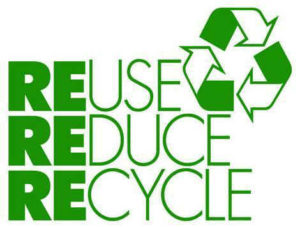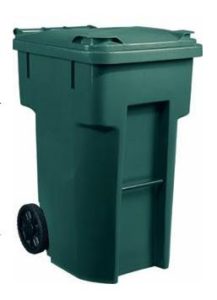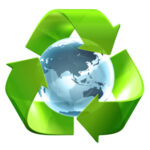 Curbside recycling by Old Lyme residents has become very routine. However, there is some evidence that many recyclables end up in the blue trash bin rather than the green recycling bin. So, to reduce those missed opportunities, the Town has appointed a Solid Waste and Recycling Committee, which will investigate and identify ways to improve recycling in Old Lyme.
Curbside recycling by Old Lyme residents has become very routine. However, there is some evidence that many recyclables end up in the blue trash bin rather than the green recycling bin. So, to reduce those missed opportunities, the Town has appointed a Solid Waste and Recycling Committee, which will investigate and identify ways to improve recycling in Old Lyme.
We plan to publish – with LymeLine.com‘s assistance – several informational articles that lay out best practices. This first piece provides an overview of our current curbside program.
Why we recycle
First, it’s the law! Connecticut implemented a mandatory recycling law in 1991; the law applies to all Old Lyme residents, every business in town. and all public and private agencies and institutions (e.g., schools); and applies, regardless of whether you rent or own, or whether you live in single or multi-family residences.
Second, and perhaps more importantly, it just makes good sense. A typical household produces nearly five pounds of solid waste each and every day. Only about a pound of that gets recycled. So, that’s about ¾ ton of trash per household per year that ends up burned or buried. Connecticut must dispose of almost 2.5 million tons of trash every year.
Clearly, the more that we recycle, the less that trash and garbage ends up in our landfills and incineration plants. Recycling enables recovery and re-use of potentially valuable materials – turning what would otherwise be treated as waste into valuable resources.
Single Stream Recycling
 In 2011, Old Lyme implemented single stream recycling to streamline recycling for residents and, since then, all recyclables can be placed, unsorted, in the green recycling bin. Many of you probably remember the old 14-gallon blue recycling boxes which required separation of glass, paper, metal, & cardboard. Residents can now recycle more at each pickup.
In 2011, Old Lyme implemented single stream recycling to streamline recycling for residents and, since then, all recyclables can be placed, unsorted, in the green recycling bin. Many of you probably remember the old 14-gallon blue recycling boxes which required separation of glass, paper, metal, & cardboard. Residents can now recycle more at each pickup.
What should we recycle?
We must recycle: all paper, cardboard; paperboard (e.g., cereal boxes & egg cartons); glass; aluminum food cans and foil; juice and milk cartons; non-deposit plastic soda bottles and cans; detergent bottles; empty aerosol cans; and all plastic labeled #1 to #7. There are more details at: http://oldlymesanitation.com/.
What should not be placed in your green bin?
Do not put any trash; plastic grocery bags; needles or syringes; Styrofoam; shipping peanuts; or food waste in your green bin. Never throw grass clippings or yard waste in the trash.
Recycling rules
- Flatten your cardboard before placing it in the bin.
- All recycled containers (cans, bottles, jars, etc.) must be empty and rinsed clean (You do not need to remove the labels).
- You should redeem your deposit bottles and cans at your supermarket rather than placing them in the bin.
- Recyclables should be placed dry and loose directly in the green bin (do not put them in plastic bags).
- Greasy pizza boxes are not recyclable.
- The plastic container code (the number inside the chasing arrows symbol) identifies recyclable plastics #1 to #7.
What do I do with all these plastic super market bags? – Just say “paper”?
Plastic bags should never be put in your green recycling bin because they can jam equipment at the facilities that prepare recyclables to be marketed. Many Connecticut supermarkets have collection receptacles for plastic bags at the store and they will then be recycled. Really, the simplest solution is to just bring reusable bags with you when you go shopping. Most of us have a back seat full of those reusable bags.
How successful have our recycling programs been?
 Connecticut has a goal of reducing, reusing and recycling 58 percent of our municipal solid waste by the year 2024. The State’s goal incorporates everything included in Old Lyme’s recycling program. Our current rate is in the range of 25 – 32 percent. The State of Connecticut rate is currently below 30 percent.
Connecticut has a goal of reducing, reusing and recycling 58 percent of our municipal solid waste by the year 2024. The State’s goal incorporates everything included in Old Lyme’s recycling program. Our current rate is in the range of 25 – 32 percent. The State of Connecticut rate is currently below 30 percent.
This article outlines Old Lyme’s current recycling program. Subsequent articles will cover areas that fall outside the curbside program (e.g., bulky items like mattresses and furniture; appliances and electronics; unused prescriptions; and paint and hazardous waste). We’ll discuss the economic costs and benefits of recycling, and review what currently happens to your trash and recycling after it leaves your bin; and provide suggestions for better recycling practice, which will bring Old Lyme closer to Connecticut’s goal.
Old Lyme’s Solid Waste & Recycling Committee meets monthly. If you have questions or comments, contact: alete1@sbcglobal.net or TDGotowka@aol.com. The recycling section of the Town’s website is also a good source of information.